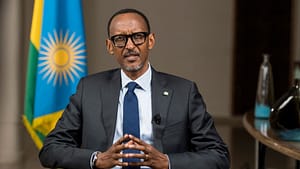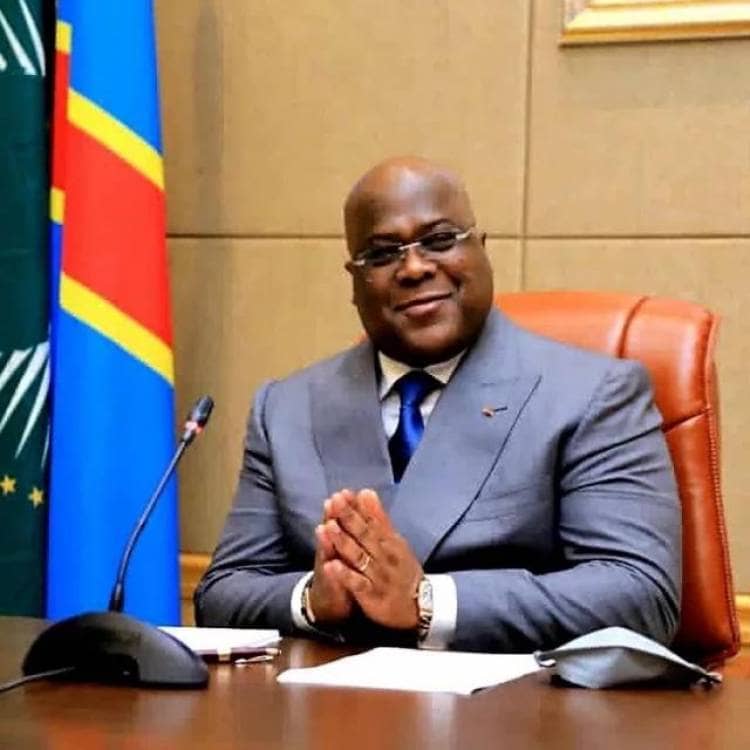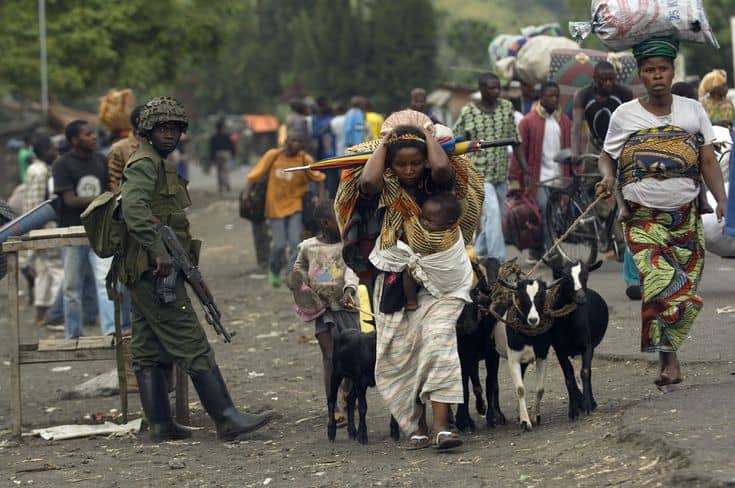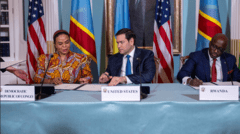




I. Smoke Over the Copper Belt
The wind over Katanga whispers of betrayal. It carries no scent of gunfire yet, but something heavy moves beneath the silence—something not unlike war. Rumors, like vultures, circle the embers of a dying trust, whispering that the Democratic Republic of Congo, the heart of the world’s mineral wealth, is on the verge of surrendering its future under the weight of another secret deal. In dimly lit conference rooms, far from the cries of the soil-stained youth of Lubumbashi or the mothers of Goma, it is said that Congo’s cobalt, copper, and coltan—the very minerals that power smartphones, electric vehicles, satellites, and drones—are being quietly negotiated into American hands. For protection. For partnership. For promises that history has taught us not to believe.
No official document has surfaced. No announcement made. But that is precisely what makes the silence terrifying. In Africa, when the land is being sold, the people are rarely told.
If true, this is not merely a contract—it is a covenant of dispossession. A transaction between global empire and local elite, negotiated in shadows, framed as a lifeline but functioning as a leash. The U.S., seeking to secure its supply of critical minerals to outpace China in the 21st-century tech race, has turned its gaze to Congo. And like many powers before it, it appears willing to make a deal that promises stability to a leader, while ensuring submission from a people.
President Félix Tshisekedi, standing atop a fragile regime propped up by foreign donors and fragile alliances, is said to be the point of contact. The deal—if real—is to offer “security support” in exchange for access to the vast mineral riches buried in Congo’s soil. But whose security? Whose riches? And who speaks for the people when their inheritance is being brokered for a bowl of foreign aid?
Across the border, President Paul Kagame of Rwanda, too, plays his role in this sinister chessboard. His alleged complicity in looting Congolese minerals through proxy militias, such as the M23, has already been well-documented in UN reports. Yet both he and Tshisekedi are presented as partners of peace to Western governments. What is being constructed, therefore, is not just a bilateral agreement—it is a geopolitical theater, where African lives are the background noise, and African futures are the bargaining chips.
But Africa is not a silent continent. And this generation is not without memory.
The DRC’s minerals have long been cursed gifts. They killed Lumumba. They fed Mobutu. They armed militias and attracted mercenaries. They sustained foreign wars and lined the vaults of Swiss banks. Now, in the name of “development” and “strategic partnership,” the U.S. appears poised to repeat the same cycle—only this time, dressed in the language of clean energy and climate transition. But beneath the green marketing is the same old hunger. And beneath Congo’s red earth, the blood has not yet dried.
This is why we write.
To speak before the ink dries. To raise the alarm before signatures are stamped. To ask, what if the rumors are true? What if another century of servitude is being arranged while the world sleeps and the youth tweet? What if our generation’s silence now ensures the enslavement of our children?
The copper belt smolders with more than mineral heat—it radiates the weight of choices that must not be made in secret. Because when the earth is traded without the consent of those born from it, it is not a deal—it is a betrayal.
And betrayal has never remained buried for long.
II. If the Rumors Are True
Suppose, for a moment, that the whispers are not just rumors. Suppose the Democratic Republic of Congo is indeed on the threshold of signing away sovereign control over the minerals that lie beneath its tortured soil—a transaction not between equal partners, but between predator and proxy. Suppose the world wakes up months from now to learn that the ink has dried, the contracts sealed, and the youth of Congo—of Africa—once again excluded from the table where their futures were sold.
The architecture of such a deal is not unfamiliar. It never arrives with the open gall of conquest. It is always wrapped in the silk of diplomacy: “strategic security cooperation,” “economic stabilization,” “investment protection.” But beneath the fine print lies a neocolonial algorithm—one that calculates African governments not as equals but as instruments, where resources are privatized, profits expatriated, and sovereignty leased under duress. If such a pact is truly being assembled between the United States and the DRC, it is not an agreement—it is a seizure. And it cannot be allowed to pass without resistance.
The DRC, the richest piece of real estate in the world by natural resources, is paradoxically one of the poorest nations on Earth. This contradiction is not accidental; it is designed. For over a century, Congo’s riches have only ever made foreigners wealthy—from Leopold II of Belgium, whose brutal reign turned human beings into currency, to the Cold War architects who kept Mobutu’s kleptocracy alive to safeguard Western interests. The present is merely a continuation of this legacy—only now, the scramble for Congo is couched in the sterile lexicon of mineral security.
And the stakes could not be higher.
What’s allegedly on the table is not a simple mining concession. This is a comprehensive mineral-rights arrangement tied to security guarantees—a kind of geopolitical mortgage. In essence, it binds Congo’s resources to the machinery of American strategic interests. For the DRC, this means the erosion of its last vestiges of autonomy over its most valuable assets. For the United States, it ensures a foothold in Africa’s most strategically vital corridor—rich in cobalt, lithium, tantalum, gold, and coltan, all of which power the military-industrial and digital economies of the 21st century.
But if the minerals of Congo fuel the world, what fuels the deal? Greed. Fear. Desperation. And power politics.
President Tshisekedi, beset by political instability and facing mounting internal pressures, may view American support as a survival mechanism. Like many leaders in post-colonial Africa, he may be tempted to believe that siding with a superpower secures legitimacy. But history has never been kind to such illusions. No African leader who traded his people’s inheritance for Western endorsement has been remembered with honor.
Moreover, any agreement of this scale—should it exist—must be interrogated by its opacity. Where is the oversight? Where is the consultation with civil society? Where are the mineral experts, the indigenous voices, the academic scrutiny, the parliamentary debate? Deals made in silence are usually crimes in motion.
And who benefits? Multinational conglomerates. Foreign political lobbies. Elite intermediaries. The profits extracted from Congolese soil rarely circle back to Congolese communities. The roads in Kolwezi are still red dust. The children mining cobalt still use their bare hands. The ghost of exploitation is not a metaphor—it is a daily fact.
Let it be said clearly: if this deal exists, it is not a partnership. It is a purchase.
And what is being purchased is not just ore—it is silence. It is complicity. It is the political sedation of a nation too traumatized to scream and a continent too fractured to act in concert.
But Africa must scream. And Congo must speak.
If we do not oppose such trajectories now—if we wait until the contracts are leaked, until the foreign flags are planted, until the mines are militarized—it will be too late. The African Union, if it is to ever be worthy of its name, must intervene. African youth must demand disclosure. African intellectuals must write with fury. Artists, spiritual leaders, elders—all must rise, for this is not just a Congolese matter.
Congo is the mirror. Africa is the face.
And if the mirror is shattered, we all bleed.
III. Deals With Devils: The American Pattern
There are no permanent allies in geopolitics—only permanent interests. And nowhere has this doctrine been more ruthlessly enacted than in the historical trajectory of United States foreign policy. If the rumored deal between the U.S. and the Democratic Republic of Congo is indeed in motion, it would not be an exception. It would be a continuation—an iteration of an imperial pattern where America arrives with smiles, signs with signatures, and departs with sovereignty in its back pocket.
Africa has been here before. So has Latin America. So has the Middle East. The names change, the flags flutter differently, but the machinery remains the same: extractive capitalism welded to military leverage. In the 20th century, it was oil in the Persian Gulf. Then lithium in Bolivia. Now, cobalt in Congo—the key to powering America’s electric future, military infrastructure, and digital empires.
To understand the danger, one must understand the pattern.
When Patrice Lumumba attempted to assert Congo’s ownership over its minerals in 1960, he was murdered—with CIA fingerprints all over the corpse. When Thomas Sankara in Burkina Faso pushed for Pan-African self-reliance and questioned the legitimacy of colonial debts, he, too, was eliminated with the complicity of Western intelligence networks. When Muammar Gaddafi proposed an African Monetary Fund and gold-backed dinar to free the continent from the chains of the IMF and World Bank, NATO jets turned Libya into a smoking ruin. Africa’s attempts at independence have consistently been answered with sabotage.
So let us not be naïve. The current engagement with the DRC—if it involves the United States offering “security assistance” in exchange for privileged access to critical minerals—is not an innocent affair. It is a calibrated strategy to secure American industrial and military dominance in the face of China’s rising influence. In this global chessboard, the Congolese are not players—they are pawns.
The language of diplomacy cloaks the brutality of intent. “Security cooperation” could well mean U.S. troops on Congolese soil under the guise of training missions or anti-terror operations. “Economic stabilization” could imply debt instruments and trade terms designed to lock the DRC into economic dependence. And “infrastructure development” may in reality refer to roads that lead only to mines, ports that export only raw materials, and agreements that prohibit value addition or local beneficiation.
In 2010, the Dodd-Frank Act’s Section 1502 required American companies to disclose their use of conflict minerals sourced from the DRC. Initially seen as a step forward, it had the unintended consequence of major corporations pulling out entirely, fearing reputational risk—leaving local communities economically stranded. America’s history in Congo, then, is not simply one of plunder but of collateral devastation—making even its humanitarian gestures suspect.
To trust a new mineral arrangement with a superpower that has broken every treaty that did not serve its interests—from Native American land treaties to the Iran nuclear deal—is to place hope in a house already burned. What credibility does Washington bring to Congo today? It has not apologized for Lumumba. It has not held its allies accountable for the looting of the DRC. It has not supported Congo’s bid for equitable trade terms at the World Trade Organization. Why, then, should Africa believe that this time will be different?
The deeper question is not merely political—it is moral.
How many generations must bleed before Africa is allowed to govern its own inheritance? How long will the continent’s role be to supply raw materials to fuel the comfort of nations that once enslaved it? And when will African leaders understand that security cannot be bought with submission, and development cannot be built on dependence?
There is no deal with empire that does not extract more than it gives.
And when America comes bearing contracts, Africa must remember its dead. For in those coffins lie not just bodies, but warnings.
IV. Two Puppets, One Battlefield: Rwanda & the DRC
The mineral war is not just global; it is regional. The theater of betrayal, exploitation, and covert deals stretches beyond the whitewashed offices of Washington. It finds its fiercest expressions in the jagged mountains of North Kivu, in the ghostly roads of Bunagana, and in the corridors of power in Kigali and Kinshasa. The Democratic Republic of Congo may be the stage, but two actors—Rwanda and its president Paul Kagame, and the DRC’s Félix Tshisekedi—are central characters in a tragic performance that bleeds Africa for foreign spectators.
It is not enough to examine the United States in isolation. Imperialism does not function without indigenous intermediaries. It needs brokers, partners, local elites willing to enforce foreign will in exchange for regime survival or personal gain. And in this regard, Rwanda and the DRC have both been complicit—albeit on different terms—in sustaining the very crisis they publicly lament.
Kagame: The Praised Predator
Paul Kagame has received standing ovations from Western audiences for decades. His image as the savior who ended the Rwandan genocide has been carefully curated to shield him from scrutiny. Yet behind the applause lies a deeply troubling reality: Kagame’s Rwanda has become a logistical and military extension of Western extraction interests in the Congo.
The United Nations has published no fewer than five detailed reports documenting Rwanda’s support for proxy militias in eastern Congo—most notably the M23 rebellion, which has terrorized local populations and created waves of internal displacement. These militias often operate with sophisticated weaponry, intelligence coordination, and—crucially—access routes that move minerals across the border into Rwanda for re-export under false certificates of origin.
Kagame’s government has created a mineral laundering hub, profiting from conflict coltan, tantalum, and gold that never originated in Rwanda but are sold globally as if they had. And yet, instead of sanctions, Kagame receives military funding, diplomatic immunity, and continued partnerships with global corporations and Western governments. Why? Because Rwanda plays its role with terrifying efficiency: suppress dissent, stabilize Western-friendly narratives, and ensure the flow of strategic resources.
Tshisekedi: The Willing Custodian
Across the border, Félix Tshisekedi inherited a deeply fractured state but has made choices that raise troubling questions. Since coming to power, his administration has leaned heavily into Western strategic partnerships, courting French, American, and Belgian investment without fundamentally reforming the corrupt structures that facilitate plunder.
Tshisekedi’s pursuit of closer ties with the U.S.—including a potential security-for-minerals arrangement—suggests a willingness to mortgage sovereignty under the banner of modernization. But modernization for whom? Roads that lead to mines but not hospitals. Military cooperation that targets rebels but not Rwanda’s incursions. Security that protects minerals but not children.
If such a deal is in the works, Tshisekedi is not simply naïve—he is participating in the outsourcing of Congolese agency, converting foreign policy into a private negotiation between elites. His silence on Rwanda’s aggression, his tolerance of opaque mining contracts, and his growing embrace of external partners all point toward a familiar postcolonial pattern: the autocrat who believes his survival is synonymous with the nation’s.
But both Kagame and Tshisekedi forget: Africa remembers.
Africa remembers Lumumba’s dream of a sovereign Congo, unchained from Western manipulation and regional betrayal. It remembers how Mobutu was sustained by Western arms and African silence. It remembers how every mineral agreement dressed in the language of development has eventually become a cage.
This is not just a confrontation between two leaders—it is a crucifixion of the Congolese people, caught between foreign greed and local cowardice. Neither Kigali nor Kinshasa speaks for the forests being destroyed, the children being enslaved in mines, or the millions displaced by wars that never end because they are never meant to.
Until African leaders stop acting as subcontractors for imperial appetites, the blood will not cease.
Until regional alliances are formed not for mutual betrayal but for collective sovereignty, the continent will remain an auction house for foreign interests.
And until the African Union demands accountability from within, no external power will ever treat Africa as more than a resource basin with a broken spine.
This is the moment. To reject puppet politics. To unmask the performers. To say: not in our generation, not again.
V. The Reckoning Beneath the Soil: A Neo-Liberationist Reflection
Beneath the black earth of the Congo, there is more than cobalt, tantalum, or gold. There are bones. There are spirits. There are unfinished sentences, aborted dreams, and the ghosts of men and women who once whispered of freedom in languages now unspoken.
They do not sleep.
And if this rumored mineral pact—opaque, one-sided, and colonial in spirit—is allowed to proceed, it will not merely be a theft. It will be a desecration. Not just of soil, but of soul. Of memory. Of the unwritten covenant between Africa’s past and its future.
The DRC, and Africa by extension, stands again at the threshold of becoming a resource for others. But this time, the historical stage is different. The colonizers no longer arrive on ships. They arrive in private jets, carrying trade portfolios and smiling through press conferences. The chains are not iron anymore. They are contracts, clauses, and debt. The whips have been replaced by drones and diplomacy.
Yet, it is bondage all the same.
And that is why the call today is not simply to protest, but to awaken. To revive the dormant sensibility of a generation lulled into silence by convenience and fear. This moment demands a Neo-Liberationist response—an ideological stance grounded in historical clarity, political courage, cultural reverence, and ancestral duty.
1. The Grave is Not the End
The dead are watching. Patrice Lumumba watches. Thomas Sankara watches. Kimpa Vita, Amílcar Cabral, Dedan Kimathi—watch. They are not just martyrs; they are mandates. They are not just memories; they are measuring rods by which we judge ourselves. If this generation allows the DRC to be sold again—its minerals exchanged for external protection, its sovereignty bartered for military aid—then we have not merely failed politically.
We have betrayed the dead.
2. Neo-Liberationism: A Mandate for the Living
Neo-Liberationism, as envisioned, is more than resistance. It is reclamation. It is the unyielding insistence that Africa belongs to Africans—not just in theory, but in practice. It is the strategic awareness that political independence without economic sovereignty is theater. That elections without control of resources are illusions. That flags and anthems mean nothing if your land still serves foreign masters.
This ideology calls for:
- Transparency in all mineral deals—public scrutiny, civic participation, and generational accountability.
- Youth mobilization—intellectual, digital, spiritual—fueled not by slogans but by strategy.
- Pan-African unity—not just as poetry, but as policy. The AU must evolve from a ceremonial club to a continental firewall.
- Naming and shaming—of leaders who betray the continent for private gain. Silence is complicity.
- Cultural resistance—through film, music, literature, and spiritual revival. The soil must not only yield minerals, but meaning.
3. Ancestral Reckoning and Prophetic Rage
There is a reckoning beneath the soil. A prophetic rage rising from the bones of the forgotten. The minerals the world covets are not neutral. They are soaked in centuries of grief. And perhaps that is their power. To awaken the living. To burden the present with the weight of the past.
When a Congolese child digs cobalt with bare hands so a Californian company can power its gadgets, that is not globalization—it is slavery dressed in silicon. When African presidents sign agreements they cannot read with foreign envoys who do not flinch, that is not diplomacy—it is a reenactment of Berlin 1884.
But this generation must say: Enough.
We are not just fighting for policy. We are fighting for a different imagination of Africa—where the continent’s resources do not exit at gunpoint, where its leaders are not puppets of foreign strategists, where its youth are not eternally unemployed while billion-dollar mines operate next door.
We are fighting for a future that is worthy of our ancestors’ sacrifice and our children’s birthright.
VI. Who Speaks for Africa?
The question is deceptively simple but infinitely complex: Who speaks for Africa? When mineral deals are struck behind closed doors, when treaties are signed without public knowledge, and when decisions affecting millions are made by a handful of elites—what voice does the continent truly have?
For centuries, Africa’s narrative has been commandeered by outsiders—colonial powers, foreign corporations, international financial institutions. These external actors have not only extracted resources but also appropriated representation. They claim to speak on behalf of Africans in boardrooms, summits, and media platforms, while silencing the very people whose lands and lives are at stake.
This is not merely a matter of rhetoric; it is a profound crisis of legitimacy and justice.
African leaders, particularly those involved in questionable deals, often assert that they are the authorized representatives of their nations. But authorization derives from popular consent and accountability—two things often absent in autocratic and opaque systems. When power is concentrated in the hands of a few, and dissent is suppressed, can these leaders genuinely claim to embody the continent’s will?
The African Union (AU), too, occupies a contradictory space. Conceived as a vehicle for unity and self-determination, the AU is often hamstrung by the competing interests of member states, lack of enforcement mechanisms, and dependence on donor funding from foreign powers. Its repeated failure to intervene decisively in crises like the DRC conflict reflects institutional weaknesses that threaten the ideal of collective African sovereignty.
Yet, there is hope in the vibrant voices emerging from Africa’s youth, civil society, intellectuals, and grassroots movements. They are the ones who speak truth to power, who reject foreign puppetry, and who demand transparent governance and ethical stewardship of natural wealth. These voices challenge the false narratives propagated by elites and external interests alike.
To reclaim Africa’s future, the continent must amplify these voices and dismantle the monopolies over representation. The continent must create forums where ordinary Africans—not just diplomats or CEOs—can define their destiny.
Until this happens, Africa’s resources will remain pawns in a geopolitical game, and its people will remain spectators in their own story.
VII. The Future Cannot Be Sold
Africa’s minerals, forests, rivers, and lands are not commodities to be pawned for short-term gain. The future of the continent is not a ledger item. It is a sacred trust, inherited from ancestors and bequeathed to generations unborn.
Any deal that treats Africa’s wealth as a negotiable asset risks mortgaging the future. It risks deepening dependency, perpetuating poverty, and exacerbating conflict. It risks turning the continent into a perpetual resource colony, where sovereignty is illusion, and self-determination is deferred.
This future must be fiercely protected.
African leaders must recognize that economic sovereignty is inseparable from political sovereignty. They must resist temptations to sell access to foreign powers under the guise of “development” or “security.” Instead, they must prioritize policies that build local capacity, encourage value addition, and diversify economies away from extractivism.
International partners must respect Africa’s agency and support equitable partnerships—ones that promote transparency, fair labor practices, environmental stewardship, and community empowerment.
The African youth must awaken to their historical role—not as passive inheritors but as active architects of a new destiny. They must reject narratives that consign them to servitude and instead cultivate knowledge, unity, and courage.
Because when Africa’s future is sold, it is not only the continent that loses—it is humanity itself.
The world’s most fertile cradle of civilization and innovation cannot be sacrificed to the appetite of foreign powers or complicit leaders.
It is time to reclaim the narrative, the land, and the future.
Epilogue: The Echo of Tomorrow
If this rumored deal is indeed underway, then history will judge us by our silence. But if this is merely the whisper of what may come, let it also be the warning that wakes the sleeping lions. The time to shout is before the ink dries. The time to resist is before the soil is lost again.
Let it be remembered that some tried to warn the continent. Let it be remembered that the youth of Africa were not all asleep. That the voices rose from across the oceans, across generations, across faiths, tribes, and tongues—to say:
“The grave is not the end. Neither for the bones below, nor the children above. Africa will rise. But only if it dares to confront the truth.”
